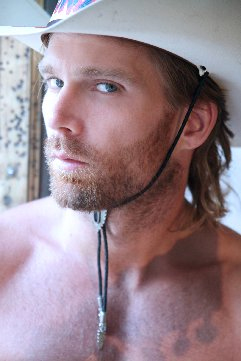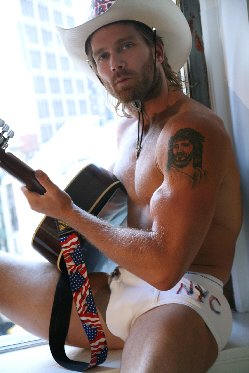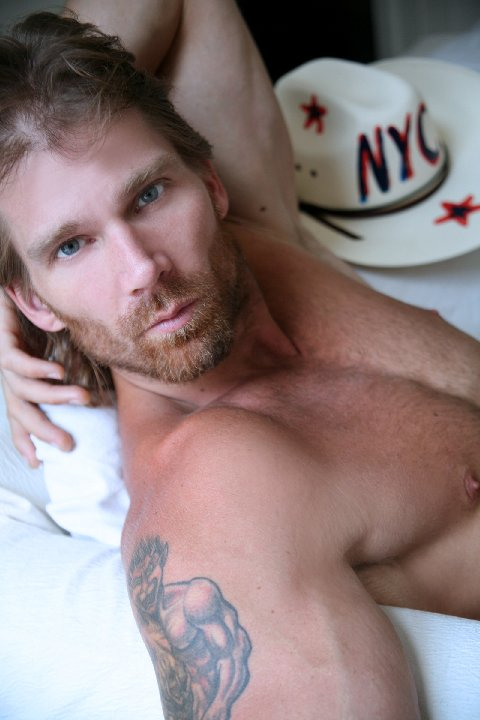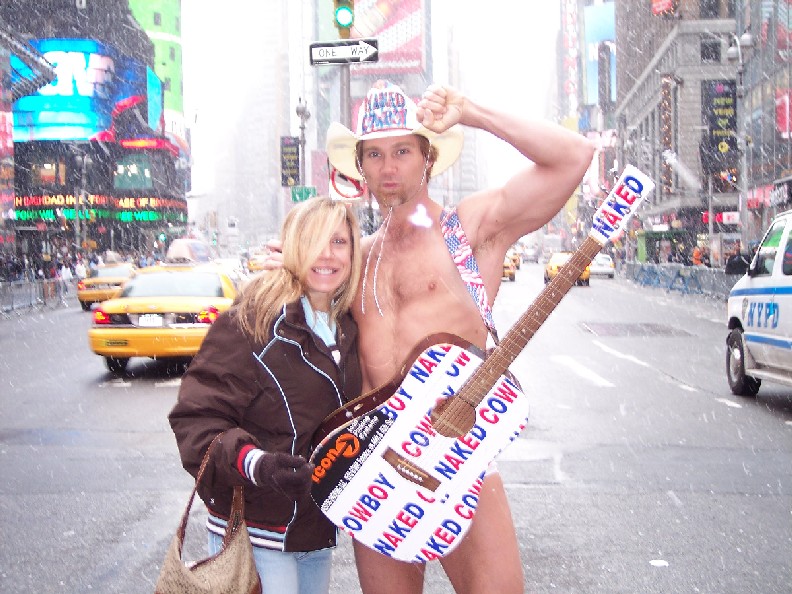

PopEntertainment.com >
Feature Interviews K to O
> The Naked Cowboy
 The
Naked Cowboy
The
Naked Cowboy
On Broadway
by
Ronald Sklar
Photography by Eugene Gallegos.
Copyright ©2006 PopEntertainment.com. All rights reserved.
Posted:
August 24, 2006.
Robert Burck, aka The Naked Cowboy, stands at the crossroads of the
world, a prism strumming a guitar. Through the millions of people who
curiously walk by him, marvel at him, laugh at him, laugh with him, narrow
their eyebrows at him, pose with him (he claims to hold about twenty
babies a day) and/or call him a fag, he finds his personal inner peace.
He’s the worst dream in your dream journal: hey, I dreamt that I was
standing in the middle of
Times Square in only my underwear, playing a guitar.
Burck, however, is in a waking state. In fact, he couldn’t be more awake,
more alive. During the daylight hours, he’s doing the flickering and the
reflecting long before those famous lights come on at night.
He
says, “I’m literally going out of my way to do what nobody else is doing
for no reason at all with no purpose. How far can I get doing absolutely
nothing?”
Pretty damn far, apparently. Through the law of
easement, The Naked Cowboy has
become a Times Square fixture, making personal
appearances in the photo albums of millions of tourists
from the four corners of this lonesome rodeo we call a planet. His refusal
to go away has lead him to an upcoming underwear line at Walmart, a
proposed reality show, a recording contract, national commercials and
countless TV and radio appearances. In addition, he performs at Mardi Gras
in New Orleans
and during Biker Week in
Daytona Beach.
And lest anyone forget, he collects business cards from everybody he’s
ever met in his entire life, and sends handwritten updates on his career
on a regular basis. His fifteen minutes of fame are being stretched further
than his hamstrings.
His
goals don’t stop there. He says, “Financially, I want to be the most
celebrated philanthropist of all time. Physically, the best-built man in
the entire world. And the most celebrated entertainer of all time. I’m
going to extend the boundary of what anybody ever conceived possible in
every single realm. People will say, ‘That guy had no limit.’”
 Mind you, he’s not really naked and not really a cowboy. He hails from
outside Cincinnati, but sounds like a good-ol' boy from the hills of Georgia,
with the mind of a deep thinker and the body of a long-distance runner (he
participates regularly in New York City marathons). His delivery, though,
is less of a jaded
Manhattan
transplant and more of a Sunday-morning-TV preacher, very confident and
articulate, determined to give a message.
Mind you, he’s not really naked and not really a cowboy. He hails from
outside Cincinnati, but sounds like a good-ol' boy from the hills of Georgia,
with the mind of a deep thinker and the body of a long-distance runner (he
participates regularly in New York City marathons). His delivery, though,
is less of a jaded
Manhattan
transplant and more of a Sunday-morning-TV preacher, very confident and
articulate, determined to give a message.
“The entire world knows who I am,” he says. “There is no escaping that
every single person knows me. Period. I am going to be a symbol of this
age. This is a commercial age. But they’re seeing a guy out there giving
complete humility of heart, you know, the crazy guy in New York City kind
of thing.”
His positive self-image may not match the perception of many onlookers,
who – well, don’t know what to make of this image, positive or otherwise.
“I’m amazed at how many people think I come out of the subway system,” he
says, “and they think, wow, he doesn’t stink. Like I’m some kind of
homeless guy who just happens to be organizing this year after year after
year.”
On
the contrary, Burck is out there daily, stuffing the
tips that
make his living into his boots. He drives his SUV into the city from Secaucus, New
Jersey, where he stays in a fifty-dollar-a-night motel. He changes out of
his clothes in a parking garage, and takes the short walk to 45th
and Broadway in his unmentionables. In New York, barely anyone notices (emphasis on the barely).
He
says, “When I go out there, and I’m playing, and I truly block it all out,
I’m not looking for anything, I’m just doing it. I’m really just focusing
on playing the songs to the best of my ability, and looking up into the
sky and taking my focus away from the objective world. The crowd lines up,
they’re everywhere, they’re attacking from every direction. When I want
their attention, I don’t have it. To the degree that I don’t care, I take
all the attention. Like a monk, it’s action-less action. [Monks] have
literally become one with what they are doing.”
His beginnings were not particularly humble, but unlikely. He was born and
raised in the
village of
Green
Hills, Ohio, his father being the famous genealogist Ken Burck. “My dad is
German, and all about organization. He’s a genealogist and mayor of the
town. It was painful then [to be raised by such an organized, ambitious
person], but as an adult, I’m all organized. Everything is perfect. I
don’t screw around.
 “I
was a little bit chunky in fifth and sixth grade,” he recalls. “One day, I
went running and I sweat. I came home and said, ‘hey, ma, look, I sweat!’ I
felt like an adult. So I started running every day. Before long, I lost
ten pounds. Mom said, ‘don’t lose any more,’ and that’s all I needed to
hear to go anorexic and go to a shrink for years. But it was all about
getting a result. It was the whole control issue. I had to be the center
of attention. My parents got divorced when I was a little kid. It was that
whole, ‘I want my mom and dad to be together’ kind of nonsense. There was
always an incredible amount of force behind what I was doing, but no
direction. Anthony Robbins turned it all around for me.”
“I
was a little bit chunky in fifth and sixth grade,” he recalls. “One day, I
went running and I sweat. I came home and said, ‘hey, ma, look, I sweat!’ I
felt like an adult. So I started running every day. Before long, I lost
ten pounds. Mom said, ‘don’t lose any more,’ and that’s all I needed to
hear to go anorexic and go to a shrink for years. But it was all about
getting a result. It was the whole control issue. I had to be the center
of attention. My parents got divorced when I was a little kid. It was that
whole, ‘I want my mom and dad to be together’ kind of nonsense. There was
always an incredible amount of force behind what I was doing, but no
direction. Anthony Robbins turned it all around for me.”
Robbins, the positive-thinking guru, and his books came into Burck’s life
just after a healthy bout with juvenile delinquency. Robbins’ program of
self-empowerment went to Burck’s well-sculptured head, as he pursued a
living as a stripper and a model, eventually posing for Playgirl
(“trying to be somebody,” he explains).
He
says, “I became quickly aware – because [Robbins] makes you aware, that
the life you are living is the life you are creating. I had been a punk
with no direction. Anything that caught my fancy, I was doing it. And I
was doing it full force. [Before Robbins,] I was caught up with everything
but I had no sense of direction.”
Picking up Robbins’ books inspired him to learn from other philosophical
cowboys.
“I
went from Robbins to [Ralph Waldo] Emerson and
[Friedrich] Nietzsche,” he says. “My grandparents
always called me Mr. Grandiose.”
He
reflects, “When I first started as The Naked Cowboy, I was looking for a
vehicle. It was all egocentric. It’s impossible to be embodied and not be
egocentric. You’re a vehicle for whatever you’re trying to communicate. At
first, I just wanted the fame, the car and all that goes with it. There is
a different quality behind it now. But even if I want to be totally
spiritual and holistic, there is still desire. But what’s the difference?
Both are a vehicle of power to say, ‘I’m everything.’ Emerson says: ‘Life
is a search for power.’ But what is power? For me, it is just the ability
to be with everyone at once. To be completely at peace in the world.”
This goal is a challenge to say the least, when you’re both naked and a
cowboy and playing for people on vacation or on their lunch break.
 He
thinks of his typical day at the office: “Smackin’ my ass, pullin’ my
hair. Somebody yelling, you fag. It’s high intensity. It’s the
opposite of living in a cave.”
He
thinks of his typical day at the office: “Smackin’ my ass, pullin’ my
hair. Somebody yelling, you fag. It’s high intensity. It’s the
opposite of living in a cave.”
When asked how he comes down from that, he responds, “I leave.”
He
sums it up thusly, “And what did I do: I just did one simple thing. I
obeyed my own instincts. I did not get attached to anyone or anything.
Jesus, Buddah, all of them, they all said the exact same thing: that you
are that force, that you are identical with the Father, that you are one
with God. That’s it. And as you separate yourself, the whole world can
come and go [but] I am God. [I’m] looking at the world without judgment,
and letting all come and go without bringing any judgment. I become a
window for them to look at themselves. Whether it’s a man shaking my hand
and saying, ‘You’re a wonderful man. I really respect what you do,’ or a
drunk that says, ‘You don’t belong in this town, you loser,’ I’m just
watching them report themselves back to themselves.”
And Robert Burck as The Naked Cowboy continues to report for duty, at the
very center of that
blinking yet
unblinking intersection.
“I’m contributing value at all times,” he says. “I work all day and give
it everything I got.”